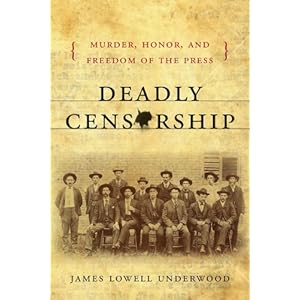New from the University of South Carolina Press:
Deadly Censorship: Murder, Honor, and Freedom of the Press (2013), by James Lowell Underwood (University of South Carolina School of Law). The Press describes the book as follows:
On January 15, 1903, South Carolina lieutenant governor James H. Tillman
shot and killed Narciso G. Gonzales, editor of South Carolina's most
powerful newspaper, the State. Blaming Gonzales's stinging editorials
for his loss of the 1902 gubernatorial race, Tillman shot Gonzales to
avenge the defeat and redeem his "honor" and his reputation as a man who
took bold, masculine action in the face of an insult.
James Lowell
Underwood investigates the epic murder trial of Tillman to test whether
biting editorials were a legitimate exercise of freedom of the press or
an abuse that justified killing when camouflaged as self-defense. This
clash--between the revered values of respect for human life and freedom
of expression on the one hand and deeply engrained ideas about honor on
the other--took place amid legal maneuvering and political posturing
worthy of a major motion picture. One of the most innovative elements of
Deadly Censorship is Underwood's examination of homicide as a deterrent
to public censure. He asks the question, "Can a man get away with
murdering a political opponent?" Deadly Censorship is courtroom drama
and a true story.
Deadly Censorship is a painstaking recreation of an
act of violence in front of the State House, the subsequent trial, and
Tillman's acquittal, which sent shock waves across the United States. A
specialist on constitutional law, James Lowell Underwood has written the
definitive examination of the court proceedings, the state's
complicated homicide laws, and the violent cult of personal honor that
had undergirded South Carolina society since the colonial era.
A few blurbs:
"The killing of newspaper editor Narcissus Gonzalez by Lieutenant
Governor James H. Tillman is a story that has needed telling for over
100 years. Finally, Jim Underwood has unraveled the killing, the murder
trial, and the aftermath and through his narrative tells a story of
unfettered freedom of the press versus hot-bloodied Southern manhood
honor. Without question, Deadly Censorship is a remarkable, eloquent,
and important book."--W. Lewis Burke, Director of Clinical Legal
Studies, School of Law, University of South Carolina
"Since the
1920s, the United States has had dozens of sensational trials--all of
which have been labeled 'the trial of the century.' There is no question
had the trial of Lieutenant Governor James Tillman for the murder of N.
G. Gonzales, the editor of the State newspaper, occurred in our time
that it would have had the same appellation. James Underwood's riveting
account of this infamous South Carolina trial is as gripping as any
contemporary courtroom drama."--Walter Edgar, author of South Carolina: A
History
